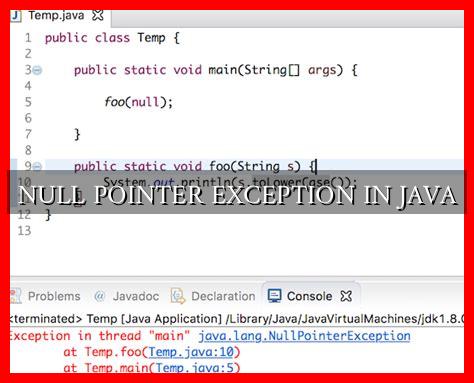-
Table of Contents
Understanding Null Pointer Exception in Java
Java is a popular programming language known for its robustness and reliability. However, one common issue that developers often encounter while working with Java is the Null Pointer Exception. In this article, we will delve into the details of what a Null Pointer Exception is, why it occurs, and how to prevent it.
What is a Null Pointer Exception?
A Null Pointer Exception is a runtime error that occurs when a program tries to access a reference variable that is pointing to null (i.e., it does not refer to any object). In Java, every object is stored as a reference, and if this reference is not initialized properly or is set to null, attempting to access it will result in a Null Pointer Exception.
Causes of Null Pointer Exception
There are several common reasons why a Null Pointer Exception may occur in Java:
- Not initializing a reference variable before using it.
- Trying to access an object’s method or property that is null.
- Passing null as an argument to a method that does not handle null values.
Example of Null Pointer Exception
Let’s consider a simple example to illustrate how a Null Pointer Exception can occur:
“`java
public class NullPointerExample {
public static void main(String[] args) {
String str = null;
System.out.println(str.length());
}
}
“`
In this example, the variable `str` is initialized to null, and when we try to access its `length()` method, a Null Pointer Exception will be thrown because `str` does not refer to any object.
Preventing Null Pointer Exception
To prevent Null Pointer Exceptions in your Java code, consider the following best practices:
- Always initialize reference variables before using them.
- Check for null values before accessing an object’s methods or properties.
- Handle null values gracefully in your code by using conditional statements or try-catch blocks.
Conclusion
Null Pointer Exceptions can be a common source of frustration for Java developers, but with proper understanding and preventive measures, they can be easily avoided. By following best practices such as initializing reference variables and handling null values appropriately, you can write more robust and error-free Java code.
For more information on handling exceptions in Java, you can refer to the official Java Exception Handling documentation.
.





